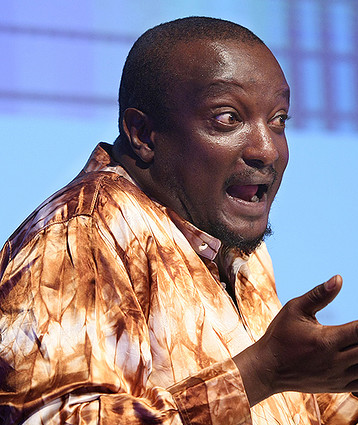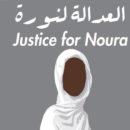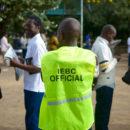A Review – One Day I Will Write About This Place – By Binyavanga Wainaina


Binyavanga Wainaina - author of One Day I Will Write About This Place, launched at the RAS on Wed 26th Oct
This is How to Write About Africa
Binyavanga Wainaina is most famous for How to write about Africa – an essay published by Granta in 2005 that formed a cynical guide to all the clichés writers generally employ when writing about the continent. A notable instruction in this piece advises:
“˜Broad brushstrokes throughout are good. Avoid having the African characters laugh, or struggle to educate their kids, or just make do in mundane circumstances.’
Wainaina’s new (and first) book One Day I Will Write About This Place is a comic refutation of the premise that this is how you write about Africa. As such, it reads like nothing I have read before, crackling with the energy of a writer who delights in revealing the multi-cultural, multi-national, multi-ethnic world of his middle-class Kenyan upbringing.
In 2002 Wainaina won the Caine Prize – the “˜African Booker’ – for his short story Discovering Home (a section of which is skilfully woven into the narrative of this memoir). The writing of the former piece is deliciously lampooned in One Day… Wainaina reveals his smart manipulation of the judges’ liberal desires – “˜I mine every sexy African theme I can think of…It is about a young girl (Girl Child, Gender!) who is questioning the world, and her mother’s values (Empowerment).’ I am wary of falling into the same trap as the Africa-entranced Caine Prize judges, but an African writer demonstrating how to manipulate the heartstrings of The West is something that brings joy to a cynical heart.
Wainaina’s book is strictly a memoir, but like all great writers of personalised non-fiction (Bruce Chatwin comes to mind) one feels there must be a fictionalised element. It is also an overtly political work, in the sense that Wainaina means to say something profound about Africa. What he is saying is both “˜this is how you write about Africa!’ and this is what modern Africa is. Wainaina’s life contains enough soap opera-like interest to satisfy the reader’s desire for plot, so we don’t get many high-octane moments of action or instances of intense excitement. Instead, the author presents his musings on what it is to be Kenyan and African through his personal experience of living these complex identities.
The great moments in the history of both Kenya and Africa in the last 20 years are dealt with lightly (much like the manner in which Wainaina deals with his own success – “˜I win the Caine Prize, and cry, bad snotty tears, and come back with some money.’) He is studying in South Africa as the apartheid regime is reaching its end, and his everyday observations of the events at this denouement place political earthquakes within a tangible personal narrative: “˜Chris Hani is dead in his driveway…and blood drips from his head and rolls down South Africa’s smooth tarmac, and you stand, dizzy. You make your way to the campus for the first time in over a month.’
And a few pages later:
“˜Mandela is President…There are now new black people in suits and ties, on television, on the streets…A good chunk of my finance class is in Johannesburg, working for Arthur Anderson.’
The South Africa section of the book is disjointed and unsettling – a story of a young man far from home in an unsettled land, full of booze and the quiet unfulfilled expectation of his gentle parents back in Kenya, carrying on.
From post-apartheid South Africa Wainaina returns to Kenya where politically things are also changing. His father, long-time Director of the Kenya Pyrethrum Board, has now retired, but “˜the new people at Pyrethrum Board have been mismanaging things…The new managing director is from Moi’s tribe. A diplomat with no experience of working with farmers.’ In what seems an almost throwaway line, Wainaina recounts that “˜the 1997 elections were rigged, Moi is back in power and the opposition is broken.’ His father continues to keep things going, travelling frequently to Nairobi playing the kind of conscientious middle class role that Wainaina says is never documented when people write about Africa.
As he delves further into the psyche of his country he grapples with the dark heart of so many half-formed news reports composed by westerners on the “˜problem’ of tribalism, It is alos at this point that we most fully encounter the author’s fascination with language. Post-colonial African states are necessarily multi-lingual places, and the cast of characters that Wainaina documents includes a sophisticated range of languages – English, Swahili, Gikuyu, Sheng, Kinyarwanda – to name but a few. It is through language – the covert whispering in office corridors in Gikuyu (the language of Kenya’s most dominant Kikuyu tribe) – that Wainaina communicates the strange resurgence of “˜tribal’ affiliation.
This is self-consciously a book about Africa that, breaking from the guidance of his earlier essay, focuses on the doctors and lawyers, teachers, civil servants, students – a profile of confused modern Africa – of Tupac Shakur and Michael Jackson, Jay-Z and MTV. The people are Kenyans, but they inhabit a cultural world with which we are all familiar. It is thus doubly affecting when Wainaina talks of political strife in his own country. What he is saying is: ‘this is a mundane thing’, a struggle for power within a modern state. It is no atavistic impulse from pre-modern people. The individuals who planned the much documented 2007 post-election violence wore suites and inhabited the corridors of a modern government within a country where multinational companies operate and broadband internet and pizza are available.
However, it is within this multi-lingual space that Wainaina also sees Kenya’s salvation. In, for example, the taxi tout who can speak both Gikuyu and Kalenjin fluently, and moderates the language in which he operates according to the origin of his passengers. Kiswahili is a language “˜used to handling diverse people…perfect for revealing unreason’ and symbolic of natural brotherhood in its manner of communication. Kiswahili as Kenya’s lingua franca is a symbol that disparate tribal peoples throughout the country have, over many years, developed ways of living together. Political strife is a base anomaly when placed next to the intricate manners of the shared national language.
“˜Words carry such pungent worldviews’ says Wainaina as slowly he appreciates his talent for shaping them, ultimately drawing an utterly convincing and radically original portrait of 21st century Africa.
Magnus Taylor is Managing Editor of African Arguments Online







hydroxychloroquine 200 mg tab https://plaquenilx.com/# hydroxychloroquine dangers
A fantastic blogpost, I just given this onto a student who was doing a little analysis on that. And he in fact bought me breakfast because I discovered it for him. :).. So let me reword that: Thanks for the treat! But yeah Thanks for taking the time to discuss this, I feel strongly about it and enjoy learning more on this topic. If possible, as you gain expertise, would you mind updating your blog with more details? It is very helpful for me. Big thumb up for this post! http://www.piano.m106.com